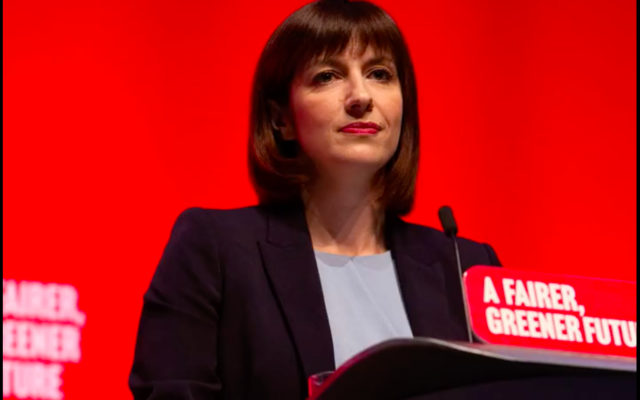Bridget Phillipson: ‘Tories have made it more difficult to tackle antisemitic hate’
Labour's shadow education secretary tells Jewish News the government is failing to protect young Jews from antisemitic hate
Lee Harpin is the Jewish News's political editor
Flawed government legislation is failing to protect Jewish youngsters from the shocking rise in antisemitism at schools, universities, and online, Labour’s shadow education secretary has warned.
Bridget Phillipson confirmed that she had held meetings with Union of Jewish Students (UJS) leaders to discuss fears that laws passed last year putting new duties on universities, colleges and student’ unions to promote free speech had actually contributed to an increase in antisemitism.
In an exclusive interview, she also said that if Labour were elected into power at the next general election the party would “need to look again” at the government’s weak online safety legislation.
The shadow minister said at present the legislation was not strong enough to protect young people from the onslaught of antisemitic, racist and misogynist hate being directed at them online.
Phillipson spoke to Jewish News during her visit to JFS secondary school in north-west London, where she engaged in a free-flowing and wide-ranging Q&A session with sixth-form politics students.
The MP for Houghton and Sunderland South since 2010 stressed that she was only too aware of the need for action to tackle rising anti-Jewish sentiment across society in the aftermath of the 7 October Hamas terror attack in Israel.
“I am very concerned about the fact I hear reports about Jewish children, and young people not feeling safe going to and from school and the real concern about rising levels of antisemitism that we see in our society and the impact that has on children and young people,” she said.
“I want all children to be safe, and supported. I am also concerned about what we see increasingly on our campuses around hate speech and the targeting of Jewish students.
“And across the board the kind of rising levels of hate crime, and Islamophobic hate crime as well.
“And how government must be a force in seeking to bring communities together to foster a society that is tolerant, respectful and welcoming of all.
“Sadly, all too often from the Conservatives I think we have had an approach that has stoked tension and division at a time when we need to do everything we can as a country to bring our diverse communities together.”
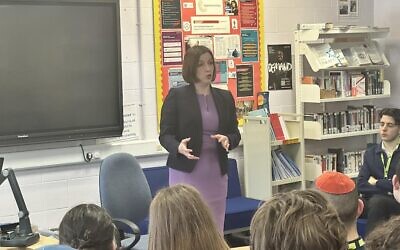
But Phillipson also highlighted the flaws she believes that are very evident in the Tories attempt to tackle antisemitism, and the rise of other forms of hate within society, through legislation passed in parliament.
The Higher Education (Freedom of Speech) 2023 Act, passed last May, had been an attempt by government to intervene over claims that an increasing number of events, including pro-Israel debates, were being cancelled by university student unions with “no-platforming” of speakers a regular occurance.
Critics had argued that official figures showed only a tiny fraction of events were actually cancelled on campus, while Labour warned that a stricter commitment to the ideals of free speech under the new legislation actually made it easier to stage problematic debates, including around Holocaust denial.
In the aftermath of 7 October, the legislation also make it more difficult for intervention over hardline pro-Palestine events where slogans such as “intifada” and “from the river to sea” can be defended on free speech grounds.
Phillipson confirms: “I’ve met with UJS, as has Matt Western, Labour’s shadow university minister who keeps in regular contact.
“I’m really concerned. We can really see the impact that rising levels of antisemitism is having on students. All young people, including Jewish students should feel safe and supported.
“And at the moment I’m really worried that isn’t the case, right across the country. Sadly, the legislation brought in through the Freedom of Speech Bill has opened up, has allowed that to flourish. And it has made it more difficult for universities to tackle that kind of hate speech on campus.”
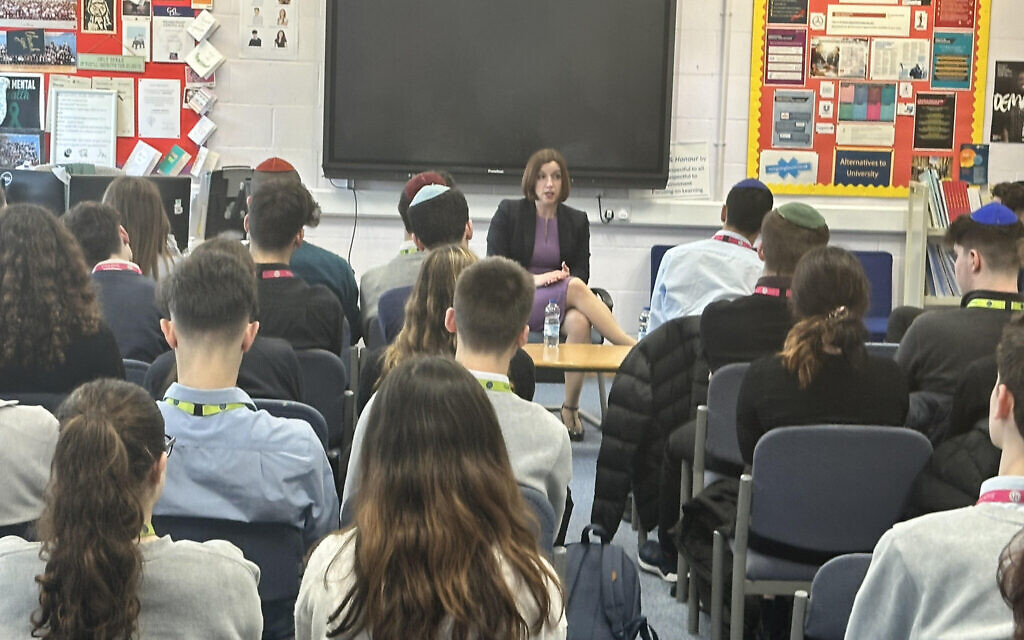
The 40 year-old MP, a mother of two, is also similarly critical of the attempts by the government to make the powerful tech companies running social networking sites or search engines promote online safety by tackling illegal material and content, including that aimed at young people.
The Online Safety Act became law in October 2023, but an initial commitment by the government to put tackling rising antisemitism at the forefront of the law seemed to have become less of a priority.
“It’s appalling it’s taken the Tories so long to legislate on this,” says Phillipson now. “Its progress has been far too slow.
“That’s been a result of all the chaos that we’ve seen in recent years in the Conservative Party, and it’s young people, including those in the Jewish community, and their safety online – they’ve been the losers in all of this while the Tories have been fighting it out.”
If Starmer wins the next election, Phillipson believes there will be a need to look at online safety laws again.
“We need to look again at making sure we are doing more to regulate what’s going on in the online space, what our young people are being exposed to.
“And making sure that social media companies in particular are stopping people having access to material where it has a damaging and serious impact on them, and is also harmful to society overall.”
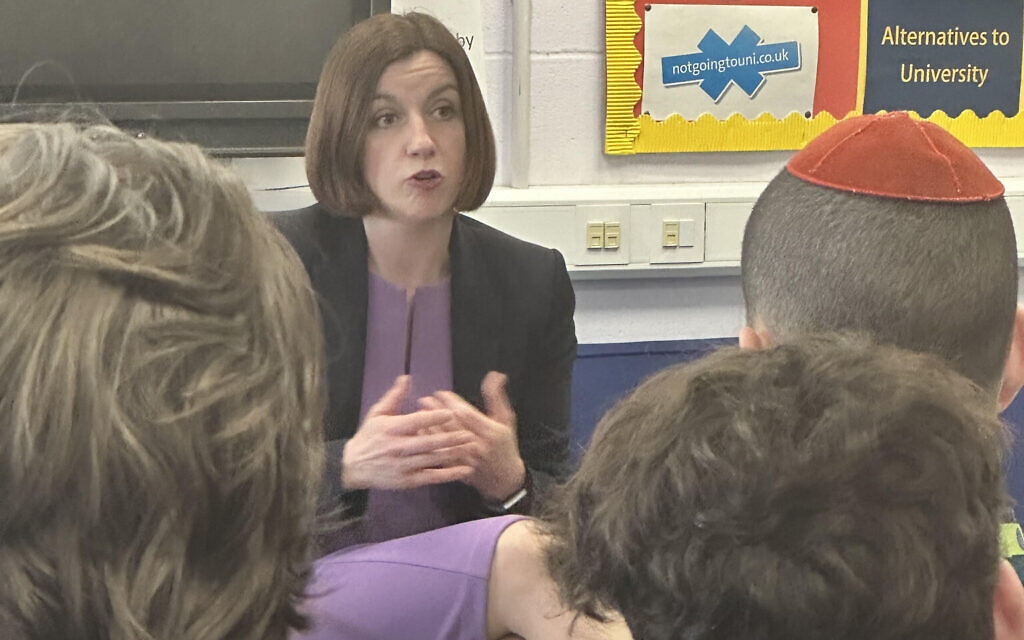
At the centre of her vision for improving attempts to battle against antisemitic and other hate speech impacting on young people, if an urgent need to improve what she says are “critical thinking skills.”
Worryingly, she concludes that at present “the messages being pumped out to our young people could, I think, well represent in the years to come a threat to national security.”
Hostile state actors are using social media platforms as a way of spreading disinformation amongst young people, says Phillipson.
“That’s why it’s incredibly important that we give young people the critical thinking skills that they need to analyse and access things in front of them. To ask questions and not to take things at face value.
“That’s true when it comes to the spread of misogyny, antisemitism,. hatred, and also wider conspiracy theories.”
She says Labour would commit carrying out a curriculum assessment review, which the party would deliver in government.
They would seek to ensure that Maths lessons include ways to “challenge and consider the use of statistics” , while in History pupils would learn to question how an author might choose to present “one kind of view”.
Children would be encouraged to “ask questions essential to a lively and vibrant democracy”.
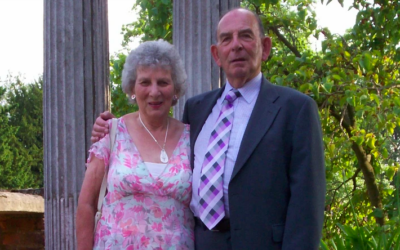
At one stage during her Q&A with JFS sixth-formers, a teacher openly suggests to Phillipson that earlier attempts by Michael Gove to meddle in the way history is now taught have not been welcomed by many of his colleagues.
Phillipson grew up in a deprived area of Washington, in Sunderland, in a council house with no upstairs heating. At state schools, including a Catholic secondary, she thrived, going on to read modern history at Oxford University, where she was also co-chair of the University Labour Club.
While the Jewish community was small in Sunderland, Phillipson recalls how he early fascination with Labour politics brought her into contact with inspirational local Jews.
This the Sunderland civic leader Charles Slater, who spent decades fighting for the future of his city, and died aged 88 in 2017 having brought Nissan cars to Wearside, championed comprehensive education and revamped the city centre.
Slater was, Phillipson recalls, an “incredible man”.
Sunderland’s small Jewish community has regularly “punched above its weight” she adds.
One senior Labour party figure, not Jewish himself, later tells me he regards Phillipson as one of those influential Labour frontbenchers known to be rated by Starmer who “instinctively get” the values of the Jewish community in this country.
After being elected as an MP in 2010, Phillipson would also join those in the PLP who took an instant dislike to the politics of Jeremy Corbyn once he became leader.
A devastating 3000 word critique of Corbyn, penned by Phillpson for the New Statesman magazine, summed up working-class disaffection with the politics of the far-left better than most.
Dame Louise Ellman also told Jewish News this week that she also considered Phillipson to be a “key ally” in the fight against antisemitism, adding it’s not always “those who shout loudest” who do the most.
Phillipson says:”I think we all have responsibility as politicians, especially those of us who are not Jewish, to call out prejudice in all its forms wherever we find it, and to tackle antisemitism wherever it arises.
“I think it is important that those of us who are not from the community recognise that we have a responsibility in fostering a more tolerant society.”
After Labour under Starmer’s leadership attempted to deal with the problem, she says the party was remain “ever vigilant to the threat that we see” especially with rising antisemitism in the country now.
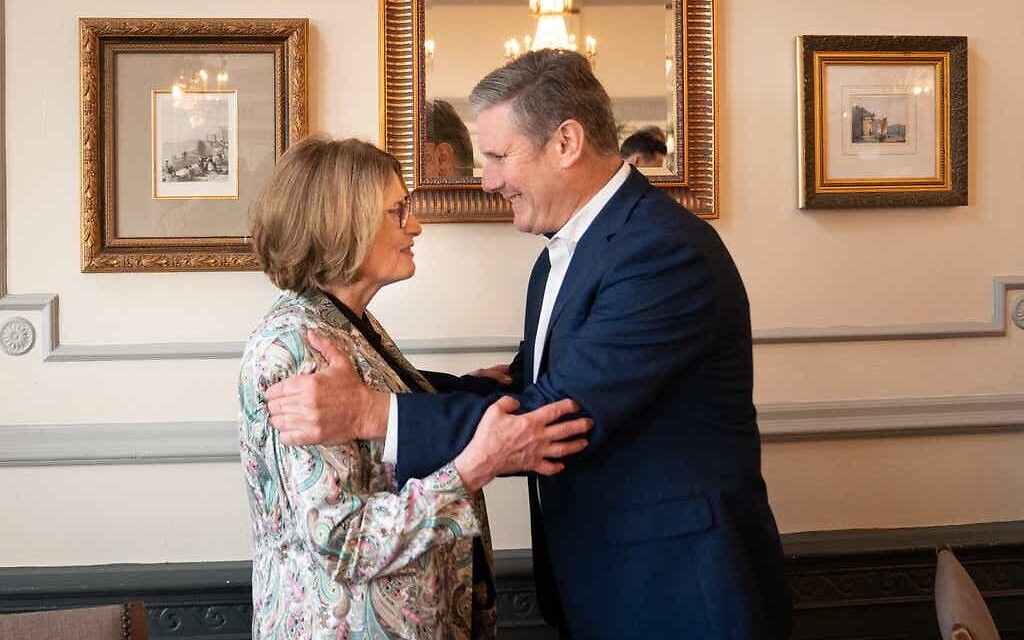
Under Starmer’s leadership in April 2020 Phillipson has flourished joining the shadow cabinet as shadow chief secretary to the Treasury, before being appointed shadow education secretary in November 2021.
Back at JFS, Europe’s largest Jewish state school, and once again highly successful under the new leadership of headmaster Dr David Moody, Phillipson says she has always been someone who “values the important contribution faith schools make to our education system and to children’s life chances.”
She adds:”I went to a Catholic secondary school myself and that was incredibly important in terms of the ethos of the school I was at. It was the value and the worth of each and everyone of us.
“I understand faith schools, and I understand why parents want them as a choice. It was brilliant to be here today at JFS to see the important contribution this school makes to the community’s life chances and to make sure they have every opportunity to flourish.”
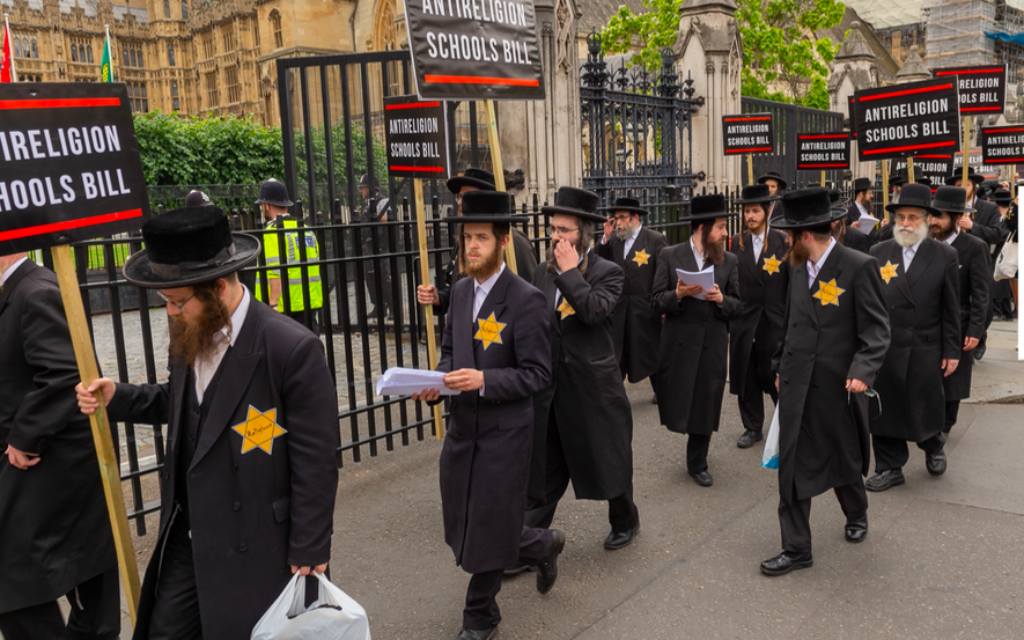
Asked for her view on the independent strictly Orthodox schools that continue to escape regulation, and have led to regular protests by those in the Charedi community who oppose attempts by government to intervene, Phillipson says it was “disappointing” that the government pulled the proposed Schools Bill.
“I believe the Tory government were right and the approach they had taken on that (with the bill),” she says. “It’s disappointing that progress has stalled in a number of ways when the government pulled the Schools Bill.
“That has left a number of areas unaddressed. Any future Labour government would need to move to legislate in some areas to make sure that we know where children are, and that we are confident of the education they are receiving. And that we’ve got safeguards in place to make sure that all pupils are properly supported.”
Alerted to the fact that these comments would spark alarm amongst some Charedi leaders, Phillipson says: “My door is always open.
“I would want to address any concerns that might exist to make sure that people felt heard and listened to. That is true right across the board.”
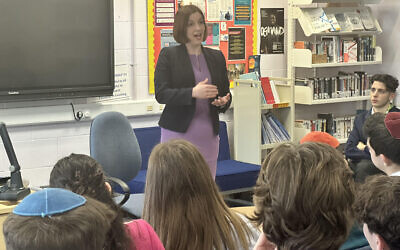
Philipson has been behind one of Labour’s more radical proposals to end the tax breaks enjoyed by private schools immediately if the party comes to power.
The party remains committed to its policy for England of charging 20% VAT on fees and ending the business rates relief from which private schools benefit, and to plough this money back into the state system.
But she tells Jewish News:”I support the right of parents to choose where they educate their children and that extends to private schools.
“This will not change under a Labour government. What will change is that we will end the tax breaks these schools enjoy so we can invest in the 93 percent of children who go to our state schools.
“That has to be a priority. We would use that money to deliver more mental health support and more teachers.”
Phillipson rejects claims made by lobby groups working for private schools that Labour’s plan will force private schools to raise their fees.
“Fees have been going up year after year, way beyond inflation,” she claims. “So private schools have choices too in how much they charge, and this hasn’t had any impact on the numbers attending private schools.
“I do think there has been a lot of scaremongering from private school lobbying groups on this point. I just don’t accept the data they are putting out there.
“The independent Institute of Fiscal Studies have been clear that this would raise £1.3bn to £1.5bn net. That’s a significant sum I would want to invest in delivering high and rising standards in our state schools. And that’s my priority.”

Thank you for helping to make Jewish News the leading source of news and opinion for the UK Jewish community. Today we're asking for your invaluable help to continue putting our community first in everything we do.
For as little as £5 a month you can help sustain the vital work we do in celebrating and standing up for Jewish life in Britain.
Jewish News holds our community together and keeps us connected. Like a synagogue, it’s where people turn to feel part of something bigger. It also proudly shows the rest of Britain the vibrancy and rich culture of modern Jewish life.
You can make a quick and easy one-off or monthly contribution of £5, £10, £20 or any other sum you’re comfortable with.
100% of your donation will help us continue celebrating our community, in all its dynamic diversity...
Engaging
Being a community platform means so much more than producing a newspaper and website. One of our proudest roles is media partnering with our invaluable charities to amplify the outstanding work they do to help us all.
Celebrating
There’s no shortage of oys in the world but Jewish News takes every opportunity to celebrate the joys too, through projects like Night of Heroes, 40 Under 40 and other compelling countdowns that make the community kvell with pride.
Pioneering
In the first collaboration between media outlets from different faiths, Jewish News worked with British Muslim TV and Church Times to produce a list of young activists leading the way on interfaith understanding.
Campaigning
Royal Mail issued a stamp honouring Holocaust hero Sir Nicholas Winton after a Jewish News campaign attracted more than 100,000 backers. Jewish Newsalso produces special editions of the paper highlighting pressing issues including mental health and Holocaust remembrance.
Easy access
In an age when news is readily accessible, Jewish News provides high-quality content free online and offline, removing any financial barriers to connecting people.
Voice of our community to wider society
The Jewish News team regularly appears on TV, radio and on the pages of the national press to comment on stories about the Jewish community. Easy access to the paper on the streets of London also means Jewish News provides an invaluable window into the community for the country at large.
We hope you agree all this is worth preserving.


